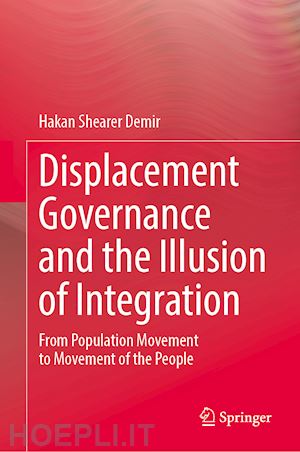
Questo prodotto usufruisce delle SPEDIZIONI GRATIS
selezionando l'opzione Corriere Veloce in fase di ordine.
Pagabile anche con Carta della cultura giovani e del merito, 18App Bonus Cultura e Carta del Docente
There is a poetic convergence between the struggles of people on the move and people in the peripheries of power, as they may collectively envision alternative forms of coexistence and fight together for fundamental rights and a dignified life. The emergence of fresh perspectives on solidarity from local communities across the board can become the driving force behind a transformative movement of the people. Examples of small yet impactful acts of solidarity in the northern Mediterranean region illustrate how migration fuels social change, leading to the alteration of established norms. These examples further challenge the dominant populist narrative of migration, and integration into mainstream society as the only viable solution.
The recent influx of migrant arrivals in Europe challenges established paradigms, rekindling discussions on human rights and democracy regarding the treatment of people on the move and their experiences after arriving in a new location. Despite dominant nation-state narratives and inadequate institutional approaches to displacement, narratives of solidarity among local communities have emerged transcending borders, shedding light on the class, race, and gender-based dimensions of migration.
In this book, Hakan Shearer Demir examines how displacement and governance influence the meaning of what it means to be "local," as it is constantly reshaped by the diverse experiences, cultural norms, and the connections of newcomers to places, people, and stories in the northern Mediterranean region. Through his Displacement Triggered Community Co-Construction Framework (CCF), Shearer Demir presents an alternative approach that combines meta-integration and municipalist principles, while taking on patriarchy and hierarchies. The CCF offers a potential pathway to establishing a community of equals that prioritizes meeting essential human needs and upholding human dignity. It is a groundbreaking approach to one of the burning questionsof our time. Shearer Demir’s book serves as a valuable source for professionals, practitioners, and academics working in the field of displacement, integration, and governance.
1. Rethinking Displacement and the Displaced.- 2. Vulnerability and Resilience.- 3. Institutional Responses to Forced Displacement.- 4. Non-institutional Responses to Forced Displacement.- 5. Rethinking Integration.- 6. Meta Integration: Co-constructing for Autonomy.- 7. Shift from Resilience to Resistance and Political Action.- 8. Eroding Democracies and the Search for Viable Common Ground.- 9. Alternatives in Local Governance and Direct Democracy.- 10. The Meta-integration Process.- 11. Municipalism.- 12. The Displacement Triggered Community Co-construction Framework.- 13. A prototype of Displacement-affected Communities in Greece and Italy.- 14. Toward New Perspectives and Narratives.- Bibliography.
Dr. Hakan Shearer Demir is an expert in the field of human rights and democratization, with a specific focus on sustainable development, displacement, local governance and cultural heritage. Dr. Shearer Demir has worked with non-governmental organizations as well as inter-governmental organizations, including the Council of Europe, the European Union, United Nations High Commissioner for Refugees, and the International Labor Organization. He has MA in international and intercultural management from SIT Graduate Institute and a PhD in Political Science from the University of Strasbourg, where he is also an adjunct faculty member. His recent work has focused on local development initiatives, heritage inclusion, refugees and migration, integration and governance with particular attention to the co-construction of communities following displacement.











Il sito utilizza cookie ed altri strumenti di tracciamento che raccolgono informazioni dal dispositivo dell’utente. Oltre ai cookie tecnici ed analitici aggregati, strettamente necessari per il funzionamento di questo sito web, previo consenso dell’utente possono essere installati cookie di profilazione e marketing e cookie dei social media. Cliccando su “Accetto tutti i cookie” saranno attivate tutte le categorie di cookie. Per accettare solo deterninate categorie di cookie, cliccare invece su “Impostazioni cookie”. Chiudendo il banner o continuando a navigare saranno installati solo cookie tecnici. Per maggiori dettagli, consultare la Cookie Policy.